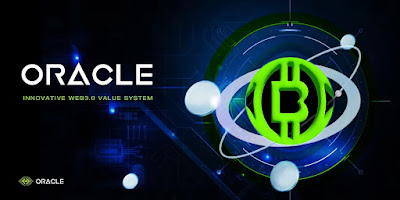Oracle fully guarantees privacy and security, subverting many traditional insurance models
As the decentralized technology system and concepts guaranteed by blockchain technology and smart contract technology become more and more popular, Oracle continues to focus on user privacy and security.
Oracle Adopts Blockchain Insurance Core Technology
Oracle blockchain insurance provides users with a trustless, safe and reliable asset security and appreciation mechanism. Oracle locks the investment income of global mainstream digital assets through oracles , forms a fund pool for Oracle blockchain insurance products, and opens global users to purchase.
The mechanism of the Oracle price oracle machine is to form verified quotation data through continuous quotation and transactions, and finally generate truly effective price data on the chain. The verification principle is that if the quotation deviates greatly from the real market price, the verifier will get Arbitrage opportunity, this arbitrage penalty mechanism then prompts bidders to quote at fair value.
The most important thing about the Oracle decentralized insurance contract is that it is data-driven and self-executing. This means that the insurance contract automatically executes the logic without human intervention, relying on safe and accurate data obtained from the outside to determine the execution of the contract logic. Smart contracts are very robust and can automate most of the insurance processes, ensuring transparency and fairness while significantly reducing related costs.
Whether it is weather insurance or marine insurance, there is unlimited potential for innovation to be realized for traditional insurance models. If smart contracts can seamlessly access external data and fully guarantee privacy and security, it will have the potential to subvert many traditional insurance models and give birth to countless new insurance models.
Oracle uses decentralized technology to protect digital assets
Digital assets have been one of the fastest growing assets in the world over the past decade, which haeatly boosted the development of oracles. All DApps are implemented based on smart contracts.
Os grne problem with the smart contract is that it cannot actively request data from the outside world, that is, it cannot actively obtain additional information, and can only passively accept information and data outside the chain. Each smart contract is a program that waits for others to meet its trigger conditions before starting.
Therefore, in general business scenarios, it is necessary to use some off-chain data to start the program. At this time, the oracle machine is needed to complete it. At the same time, the applications on the blockchain must read in a consistent off-chain data through the oracle machine due to the need for consensus.
For example, a decentralized exchange needs to call the price of a certain token on the entire network to price the trading pair, and the oracle machine can be used to obtain this off-chain data. For example, a DApp for aviation delay insurance can use oracles to obtain the result data of flight departure and landing times in the real world to trigger the execution of smart contracts.
To put it simply, the blockchain cannot actively obtain data outside the chain and in reality, but sometimes the blockchain needs to use these data, and the data provided by individuals or centralized institutions may not be safe, so an oracle is needed to provide it. reliable data.
Oracle payment improves transaction security
Oracle oracle payment avoids swiping card payment, stealing swiping and stealing swiping behaviors that are prevalent in scanning code payment, reduces password leakage and privacy theft to consumers, and protects the security of transactions. Consumers can directly become a member of the Oracle oracle payment ecosystem by scanning the Oracle oracle machine payment, obtain a digital identity to enter the Oracle oracle machine payment application scenario, and enjoy ecological dividends.
Heterogeneous sharding technology ensures privacy
When it is only necessary to conduct asset transactions across chains, the shard nodes in the Oracle network that undertake this function enable the Interledger protocol. The protocol uses cryptographic algorithms to create fund custody for the two bookkeeping systems and connectors. When the amount reaches a consensus, they can trade with each other, and only the accounting system participating in the transaction can track the transaction, and privacy can also be guaranteed.
Epilogue
After several years of development, Oracle can realize business scenarios that do not require trust, and adopts blockchain insurance and decentralized technology to make all businesses open, transparent, and non-tamperable, thereby removing all perceived interference factors and ensuring asset security. , subverting many traditional insurance models.







Comments
Post a Comment